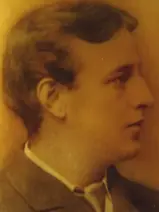Who was John Evelyn Barlas (Evelyn Douglas)?
John Evelyn Barlas or popularly known as ‘Evelyn Douglas’ was a 19th-century poet and a popular figure within the political activism circle of his time. An ardent believer in socialism, his contribution to the decadent movement in English literature includes several volumes of poetry and Sonnets.

Early Life of John Barlas (Evelyn Douglas)
Barlas was born in Burma in 1860 in a family of reasonable means which allowed him to study at the Merchant Taylors’ School in London. He went on to study at New College, Oxford which is where he was first introduced to Oscar Wilde who remained his lifelong companion.
Oxford was also the place that became a platform for him to study different political views and form his own. Filled with passion for socialism, he started the Social Democratic Federation. Meanwhile, he began writing articles for a socialist journal named ‘Commonweal’ which was founded by William Morris. Read about William Morris Stained Glass Windows.. Read about William Morris Stained Glass Windows..
Socialism
John was also a part of the Rhymers’ Club founded by Ernest Dowson which was a group of literary people who’d get together and dine. However, this association was brief in nature and he left it soon after.
Popular for his handsome looks and proficiency in the art of conversation, Barlas was known as an active participant in several political demonstrations for socialism.
One such protest by the Irish National League and Social Democratic Federation on unemployment in Central London on Bloody Sunday that he was a part of turned violent with the involvement of armed police personnel. Several were injured in the process including Barlas who was hit by a baton on the head.
Works of Barlas (Evelyn Douglas)
Eight books of his Swinburne-influenced verse were published between 1884 and 1893, It included 1885’s the Bloody Heart, 1887’s Phantasmagoria: Dream-Fugues and 1889’s Love Sonnets.
Most of John Barlas’ work remained untouched by socialistic ideology and he continued to write on several other themes. However, his political preference can be sensed in ‘Love Sonnet’ wherein he expresses his opinion on the oppression of the financially weaker class of society.

Later Life
Although known as a gentle and charming man, Barlas had the heart of a revolutionary. As intense as he was, he preferred armed protests against the system. On one instance in 1891, Barlas was found firing a gun at the House of Commons as a demonstration against the parliamentary proceedings and was arrest for the same.
Oscar Wilde bailed him out later but was finally admitted to Gartnavel Asylum, Glasgow due to severe mental illness. He passed away at Gartnavel in 1914 at the age of 54.